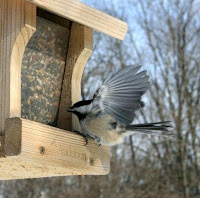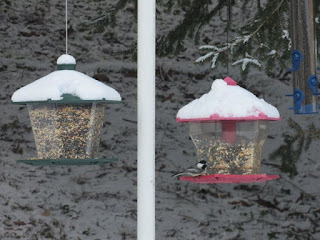A week or so ago, my friend and romance novelist Carol Henry shared an observation. She hung a number of feeders around her house and noticed that the red feeders ran out of seeds before the others.
Do birds like the red feeder more than the green one? she asked her Facebook friends.
So she hung a green feeder outside her office window right next to the red one. And the red feeder emptied faster. “Just to be sure, we traded places and put the red feeder where the green one was, and the green where the red one was.” She refilled both feeders with seeds and the same thing happened: the red feeder emptied much, much quicker. Then, she replaced the green feeder with a red feeder and refilled them with seeds. This time both feeders emptied within the same time frame.
My friend is not a professional scientist, but she is curious. To me, that curiosity is the core of being a scientist: question-asking, doing an experiment, noting observations, sharing information with others, and encouraging them to explore those same questions. Carol isn’t the first person to ask whether birds prefer different feeder colors. A few years back, the Royal Society for the Protection of Birds asked a similar question: Do different colored feeders attract different birds? They found that some birds preferred silver feeders, others preferred blue, and still others would rather visit red feeders. And that this color preference changed with the season.
But back to my friend’s question: do the birds in her yard prefer the red feeders over the green feeders? I asked my ornithologist friend, Tom Sherry, what he thought. Tom is a Professor in the Dept. of Ecology and Evolutionary Biology at Tulane University and he noted that, while hummingbirds are definitely attracted to red colors, he had not heard about color preference for seed feeders.
“I’d want to know exactly how close the feeders are to each other,” he said, “because slight differences in position, such as how windy and distance from vegetation cover, can make a huge difference. Even slight differences in seed mixtures could matter, or whether birds have equal access to seeds, or perch, at both feeders. You want to be sure it’s just the color, and not some “hidden” variable that’s causing the difference.”
Needless to say, Carol’s question generated a bit of discussion between a few of us who feed the hardy feathered souls that overwinter in upstate New York. I’ve got a green feeder, but now I’m wondering whether I ought to head to the hardware store and buy a red feeder?
 Meanwhile, I have a question: does the red feeder attract
different birds than the green feeder? And if so, will the preference will hold
as we get closer to spring?
Meanwhile, I have a question: does the red feeder attract
different birds than the green feeder? And if so, will the preference will hold
as we get closer to spring?Drop by on Wednesday to find out how to recycle a plastic bottle into a bird feeder so you can do your own backyard bird science.

Fascinating. I look forward to knowing if you buy a red feeder (or paint yours) and if it makes a difference. I have a clear plastic feeder that is on my window, and I just love watching the birds come to eat. I have one who taps on the window if it gets empty, and I don't get out there to fill it quickly.
ReplyDelete